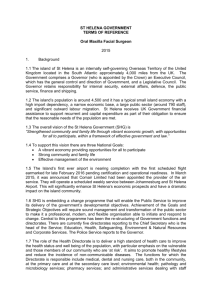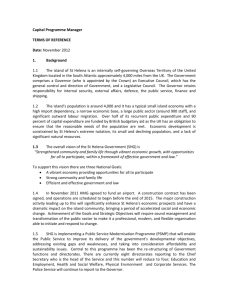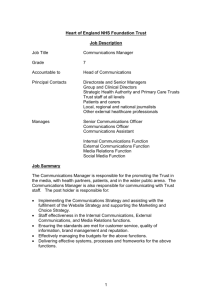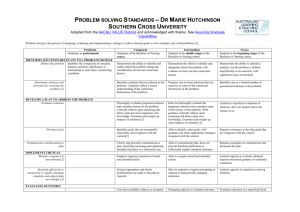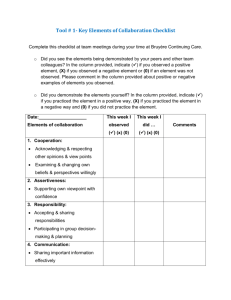St Helena: Chief Engineer for Public Works and Services
advertisement
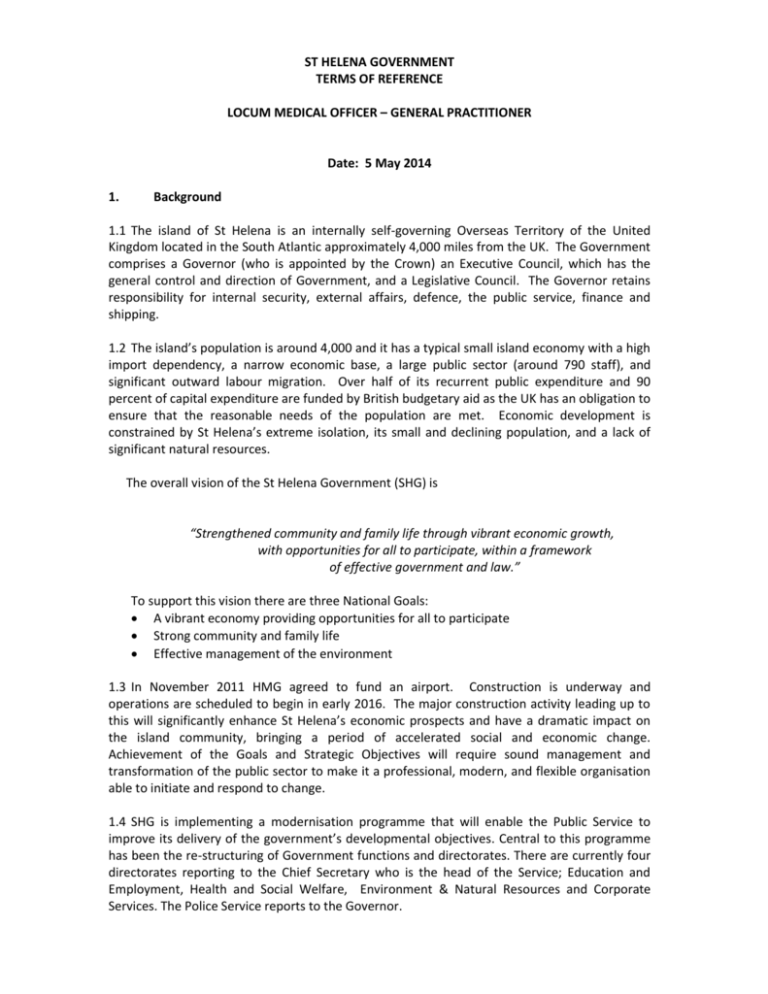
ST HELENA GOVERNMENT TERMS OF REFERENCE LOCUM MEDICAL OFFICER – GENERAL PRACTITIONER Date: 5 May 2014 1. Background 1.1 The island of St Helena is an internally self-governing Overseas Territory of the United Kingdom located in the South Atlantic approximately 4,000 miles from the UK. The Government comprises a Governor (who is appointed by the Crown) an Executive Council, which has the general control and direction of Government, and a Legislative Council. The Governor retains responsibility for internal security, external affairs, defence, the public service, finance and shipping. 1.2 The island’s population is around 4,000 and it has a typical small island economy with a high import dependency, a narrow economic base, a large public sector (around 790 staff), and significant outward labour migration. Over half of its recurrent public expenditure and 90 percent of capital expenditure are funded by British budgetary aid as the UK has an obligation to ensure that the reasonable needs of the population are met. Economic development is constrained by St Helena’s extreme isolation, its small and declining population, and a lack of significant natural resources. The overall vision of the St Helena Government (SHG) is “Strengthened community and family life through vibrant economic growth, with opportunities for all to participate, within a framework of effective government and law.” To support this vision there are three National Goals: A vibrant economy providing opportunities for all to participate Strong community and family life Effective management of the environment 1.3 In November 2011 HMG agreed to fund an airport. Construction is underway and operations are scheduled to begin in early 2016. The major construction activity leading up to this will significantly enhance St Helena’s economic prospects and have a dramatic impact on the island community, bringing a period of accelerated social and economic change. Achievement of the Goals and Strategic Objectives will require sound management and transformation of the public sector to make it a professional, modern, and flexible organisation able to initiate and respond to change. 1.4 SHG is implementing a modernisation programme that will enable the Public Service to improve its delivery of the government’s developmental objectives. Central to this programme has been the re-structuring of Government functions and directorates. There are currently four directorates reporting to the Chief Secretary who is the head of the Service; Education and Employment, Health and Social Welfare, Environment & Natural Resources and Corporate Services. The Police Service reports to the Governor. 1.5 The role of the Health and Social Services Directorate is to deliver a high standard of health and social care to improve the health status and well being of the population, with particular emphasis on reaching the vulnerable and those members of our community who are ‘at risk’. We aim to promote healthy lifestyles and reduce the incidence of non-communicable diseases. 1.6 The functions for which we are responsible include medical, dental and nursing care, both in the community, at the primary care and at the secondary care level and also covers student nurse training; environmental health (including solid waste management); care of older people; social services, child protection and services for the disabled; pathology and microbiology services; pharmacy services;, Government Landlord Housing assessments, administrative services dealing with staff recruitment, budgeting, procurement, divestment activities and overall support to other sections of the Directorate. We deliver the following services: Community Primary Care Services, including Outpatient clinics at 3 areas of the Island and in Jamestown clinic, community nursing services, specialist nurse led clinics for those with long term conditions, mental health services as well as family planning and women and child health clinics Medical and Nursing services, including hospital services such as surgery, acute care, maternity and accident and emergency services Nurse Education through the School of Nursing Physiotherapy and Occupational Therapy services Dental services Environmental Health services including solid waste management, meat and fish inspections, food hygiene safety, port health, pest control and workplace health and safety Laboratory services including Phlebotomy services, haematology and bio-medical lab services, food and water testing services, pathology testing Pharmacy services in Jamestown and mobile pharmacy services to support outpatient clinics Social services, including safeguarding children and providing support during domestic disputes, family placements for private fostering, support to disabled members of the community under 65 years of age, Child Protection, operation of the Family Centre and management of learning disability services Older Persons services (reintegrated under social services early 2013), involving care for people over 65 years at home and home care support service, rehabilitation, respite care and residential care and management of the Community Care Centre and Sheltered Accommodation Units at Longwood and Cape Villa. Social welfare services dealing with, assessment of Government Landlord Housing and registration and monitoring of the unemployed Administration services providing support to all sections of the Directorate, which employs a total of 215 full-time staff and an additional 40 home helpers (8-10 FTE total). 2. Key Objectives 2.1 The overall objectives of the post of are: To participate in the general practice clinics and share out-patient and in-patient duties and undertake on-call duties To safely dispense & administer medications to patients. To ensure all client/patient contacts are noted on the EMIS on a daily basis and diagnosis and patient management are clearly recorded 2 3. To provide training to Nurses and other healthcare workers and participate in weekly half hour CPD (30-60 minutes) sessions with medical officers. Scope of Work The duties of the General Medical Officer shall include, but not be limited to, the following: 3.1 Responsibility for general medical duties to all island residents and visitors (in conjunction with other members of the medical team as appropriate), which includes: developing and improving the Primary Care Services on the island under supervision of the Clinical Director (CD) with special emphasis on prevention, early detection and care and support for people with chronic non-communicable diseases running outpatient clinics at various location of the island every week, including evening clinics. 3.2. Actively supporting the programme of health services reform currently being undertaken by Directorate of Health and Social Welfare within the Directorate’s Strategic Plan 2014-2017. This will include: undertaking specific tasks in relation to health policy and organisation 3.3. Playing an active part in health promotion and preventative care programmes. This will entail: participating in programmes already underway, building on these where necessary developing and implementing new programmes and initiatives to improve the overall health of the population through the use of various methods, including contributing to Healthwatch articles; and participating in radio talks on health related topics participating in weekly CPD sessions with the Medical team providing training and CPD for nursing staff and nursing students when required 3.4. Submitting an action plan for the speciality clinics and service areas for which the postholder will be responsible (which is expected to cover diabetic care and possibly other areas which will be assigned upon arrival, depending on area of expertise) within 2 weeks after commencing of contract. 3.5 Providing assistance to colleagues in particular areas of expertise when and where appropriate. In particular, support the community nursing team with promoting self monitoring of Diabetic and Hypertension patients and setting up and guiding expert patient groups 3.6 Undertaking programmes of medical and clinical audit as required under the direction of the CD 3.7. Actively participating in and contributing to the healthcare governance committee 3.8. Assisting the CD in collection of health information data as required. 3.9. Submit comprehensive concise contract completion report to the CD as per agreed format, including recommendations for further service improvements and a 1 page agreed action plan in discussion with CD to take the recommendations forward. The report should 3 include details of progress related to primary care level service provision and achievements against targets/benchmarks 3. 10. 4. Carrying out other duties as required. Qualifications and experience 4.1 Essential A minimum of 10 years experience as general practitioner full G.M.C. registration or equivalence and good standing with that body very good command of the English language 4.2 Desirable Specialist in general medicine Overseas experience in a remote location ATLS, APLS or equivalent 5. Competencies Under the SHG Competency framework, this post holder is required to have the competencies as outlined in the attached annex. 6. Outputs, Timing and Reporting 6.1 The General Medical Officer shall provide to the Clinical Director monthly reports on progress against key indicators to be agreed in advance with the Clinical Director. 6.2 The post is for a Locum, required as soon as possible, for a period of up to six months. Performance will be measured with respect to achievements against the above mentioned action plan (section 3.4) and the Directorate’s overall performance in service delivery, increases in operational effectiveness and efficiency. 6.3 The General Medical Officer will report directly to the Clinical Director. 4 Annex SHG Competency Framework Levels Professional Development Requirements for Continuous Professional Development met in terms of requisite number of hours/number of development sessions, etc., and when necessary submitted to Professional Institute to maintain professional status. Planning and delivery of work Plans and organises work to meet individual, team and directorate/departmental objectives whilst achieving quality and value for money. Recognises good performance and tackles poor performance. Ensures delivery against plan. Identifies information needs and ensures they are delivered in a timely and effective manner Analysis and use of information Interprets complex written information. Able to assess the validity, relevance and limitations of different sources of evidence. Generates a range of options and appraises them based on evidence available. Decision making Solves problems that have significant short-term implications for the organisation. Assesses the impact of decisions. Identifies causes rather than just symptoms to inform solutions. Uses trends and patterns in information for evidence based decisions. Confident in making decisions within policy guidelines Assembles available knowledge to ensure evidence based decisions. Working with others Informs, consults and influences others using a range of communication mechanisms. Engages with others to gather information Shares and implements good practice with others Works with senior management and other stakeholders Communication Ensures important messages are understood. Ensures written communications are well structured and have clear meaning. Presents information so that it has a positive impact on the recipient. Engages well with others to understand their needs and aspirations. Influencing and persuading Encourages and provides constructive feedback to improve performance. 5 Ensures alternative approaches to work are effective in meeting the organisation and individual needs Remains constructive when disagreeing or challenging. Challenges inappropriate employee behaviours. Dealing with change Supports individuals in their team through periods of change. Listens and responds to constructive feedback. Initiates new ways of doing things. Recognises and deals with obstacles to change. Promotes goals or new initiatives to others. Continuous improvement Makes business and efficiency improvements through use of appropriate systems and tools. Able to coach and develop individuals Shares knowledge and experience with others Manages own development and performance Learns lessons from both successes and failures Managing resources Ensures appropriate resources and levels of capability to deliver to plan Uses management information to monitor/control resources. Supports initiatives for new and more efficient use of resources. Gains respect and credibility from team members through effective delegation, coaching and development. Required Clinical Competencies Effectively plans, delivers and evaluates care, interventions and/or treatments to meet peoples health and wellbeing needs o Identifies and implements the relevant overall care /treatment plan for patients that is consistent with evidence-based practice and/or clinical guidelines, identifying specific precautions or contraindications, whilst respecting the individuals privacy and dignity and ensuring patients consent is sought and given whenever possible. o Monitors individuals’ reactions to care / interventions/treatment and takes the appropriate action to address any issues or risks. o Reviews the effectiveness of the interventions/treatments and other specific activities and makes any necessary modifications, ensuring feedback to the MO responsible for patients overall care. o Maintains accurate records of the activities undertaken and outcomes. o Responds to, records and reports any adverse events or incidents relating to the intervention/treatment with an appropriate degree of urgency. Effectively assess physiological and/or psychological functioning and develop, monitor and review related treatment plans. 6 o o o Determines and records diagnosis and treatment plans according to agreed protocols/pathways/models. Recommends changes to the protocols and guidelines to the Clinical Guidance Committee. Identifies individuals whose needs fall outside protocols/pathways/models and makes referrals to the appropriate practitioners with the necessary degree of urgency. Effectively communicates with patient’s relatives and explains the patient’s care with them as appropriate o Displays sensitivity to relatives’ level of understanding, culture, background, body language, feelings and emotions and preferred ways of communicating. o Identifies the purpose of the communication with the relatives and anticipates its effect, effectively explains the patients care in non-medical language. Promote, monitor and maintain best practice in health, safety and security o Identifies the risks involved in work activities and processes. o Identifies how to manage the risks consistent with legislation, policies and procedures. o Takes the appropriate action to manage an emergency, summoning assistance immediately when this is necessary. o Reports actual or potential problems that may put health, safety and security at risk and suggests how they might be addressed. o Supports others in maintaining health, safety and security. Effectively supervise people’s work during a shift o Gives people opportunities to contribute to the planning and organisation of their work o Develops and explains plans and work activities to people and enable them to carry out their work effectively, consistent with legislation, policies and procedures Required Managerial Competencies Proactively identifies the needs and expectations of patients and strives to meet these o Ascertains and / or anticipates patient requirements to ensure that where possible these are met. o Explains sensitive or complicated information in a manner focused on the patients perspective and understanding. o Establishes positive relationships with patients. o Obtains regular feedback and acts on it to improve patient service. o Always considers the impact on all patients when making decisions. Ensures the quality of own work meets job requirements and encourages quality in others work o Works within the limits of own competence. Not to attempt any procedure not trained for and experienced in. o Organises and prioritises own workload to ensure provision of a quality service. o Identifies opportunities to improve quality of own work and where appropriate underlying working practices. 7 Pro-actively committed to developing own personal skills, knowledge and behaviours, in order to improve performance within current role and potentially prepare for career moves. Supports others in their development. o Undertakes self review and seeks feedback from others on own work, and emerging job requirements. o Acknowledges own development needs, suggests areas for learning, and agrees personal development objectives for current role and career development areas. o Takes responsibility for own personal and/or professional development. o Takes an active part in learning opportunities, evaluating the effectiveness of these and providing relevant feedback. o Maintains up-to-date portfolio of own development activities o Contributes to the development of others (e.g. through sharing knowledge, skills, experience or information), and partakes in the weekly CPD sessions. o Contributes to developing the workplace as a learning environment. o Generates and uses appropriate learning opportunities and applies own learning to the development of practice. Able to appropriately and effectively use a range of communication approaches in order to inform, influence or persuade people in relation to more difficult subjects and / or situations. o Demonstrates the ability to respond quickly, constructively and honestly when challenged, encouraging input and feedback. o Thinks ahead and prepares well for situations that involve persuasion and negotiation. Enables the team to achieve objectives, through actively building and promoting an effective team, within a multidisciplinary environment. o Achieves commitment and ownership of the teams objectives through sharing responsibility with team members. o Demonstrates high standards of integrity, honesty and fairness, leading by example. o Keeps team members informed and up-to-date about all relevant or useful information. o Supports and champions the team, ensuring they understand their role in the wider organisation. o Supports team members in delivering change. o Adopts an open, visible approach, actively participating in the team and being readily available to team members for discussion, advice or consultation. Required to comply with Good Medical Practice (GMC)as defined by the UK General Medical Council, details of which are available on the GMC website 8
